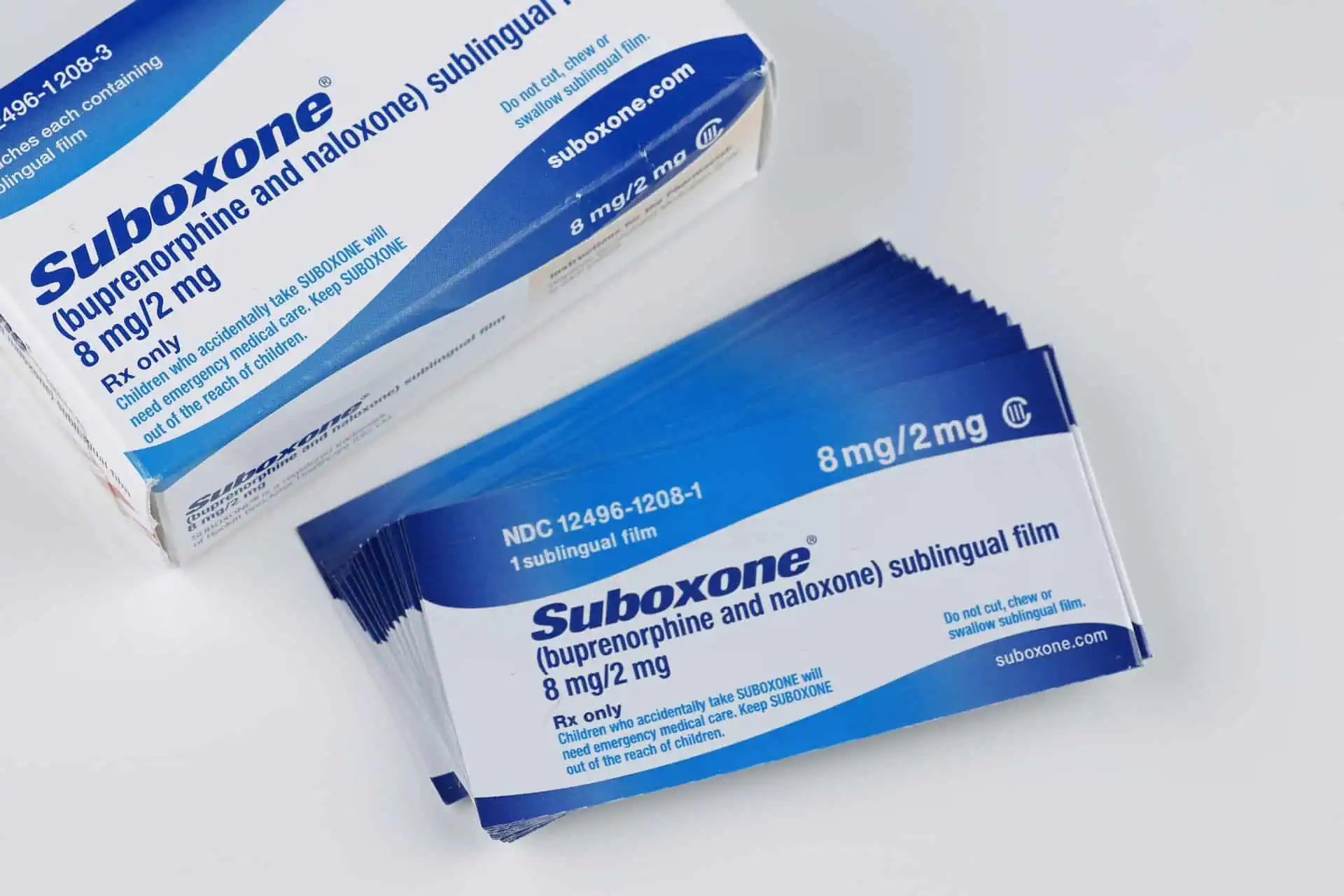FAQ: Can I Still Apply for the Suboxone Lawsuit?
- Last Updated: July 14th, 2025

Attorney Jessica Paluch-Hoerman, founder of TruLaw, has over 28 years of experience as a personal injury and mass tort attorney, and previously worked as an international tax attorney at Deloitte. Jessie collaborates with attorneys nationwide — enabling her to share reliable, up-to-date legal information with our readers.
Legally Reviewed
This article has been written and reviewed for legal accuracy and clarity by the team of writers and legal experts at TruLaw and is as accurate as possible. This content should not be taken as legal advice from an attorney. If you would like to learn more about our owner and experienced injury lawyer, Jessie Paluch, you can do so here.
Fact-Checked
TruLaw does everything possible to make sure the information in this article is up to date and accurate. If you need specific legal advice about your case, contact us by using the chat on the bottom of this page. This article should not be taken as advice from an attorney.
Key takeaways:
- Suboxone tooth decay lawsuits have been consolidated into multidistrict litigation (MDL 3092) to allow plaintiffs to collectively seek compensation for dental injuries linked to Suboxone film use.
- The litigation process of the Suboxone MDL 3092 involves several steps, including the initial case filings, discovery phase, pre-trial motions, and bellwether trials.
- The bellwether trials are expected to begin as early as 2025 to evaluate the strength of plaintiffs' evidence, assess potential compensation for various damages, and establish legal precedents.
FAQ: Can I Still Apply for the Suboxone Lawsuit?
Question: Can I still apply for the Suboxone tooth decay lawsuit?
Answer: Yes, TruLaw is currently accepting clients for the Suboxone tooth decay multidistrict litigation (MDL).
The Suboxone tooth decay lawsuit represents consolidated legal actions against Indivior, the manufacturer of Suboxone sublingual film, for allegedly failing to warn patients and healthcare providers about severe dental risks associated with their opioid addiction treatment medication.
On this page, we’ll discuss this question in further depth, damages claimed in Suboxone lawsuits, eligibility criteria to file a Suboxone tooth decay lawsuit, and much more.
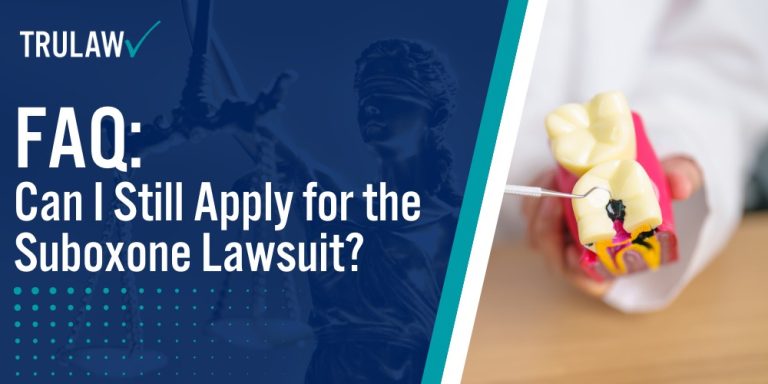
Overview of the Suboxone Lawsuit
The Suboxone MDL centralizes thousands of individual dental injury claims under Judge Calabrese in the Northern District of Ohio.
The defendant named in the MDL (Indivior Inc.) has previously faced criminal and civil charges for the promotion and marketing of their opioid use disorder medication, leading to a settlement of over $600 million in 2022.
The key allegations made by plaintiffs in the Suboxone MDL include, but are not limited to:
- Side effects of Suboxone sublingual film cause dental damage, including tooth decay, erosion, and cavities, leading to extensive dental procedures due to the acidic nature of the medication.
- Indivior Inc. knew or should have known about these oral health risks but failed to warn patients and doctors adequately before the FDA’s official announcement in 2022.
- Patients could have chosen alternative treatments had they been warned of the medication’s oral health risks.
Multi-district litigation (MDL) is commonly used in pharmaceutical litigations to present a unified front against the resources of large corporations.
They also provide an opportunity for collaboration between plaintiffs’ representation during pretrial proceedings and discovery to preserve the individual aspects of each claim.
If you or a loved one has experienced dental problems after using Suboxone, you may be eligible to seek compensation for your injuries.
Contact TruLaw using the chat on this page to receive an instant case evaluation and learn if you qualify to file a Suboxone lawsuit today.
Table of Contents
Damages Claimed in Suboxone Lawsuits
Individuals pursuing claims in the Suboxone litigation are seeking compensation for both economic and non-economic damages based on the severity of the oral health issues experienced after taking the medication.
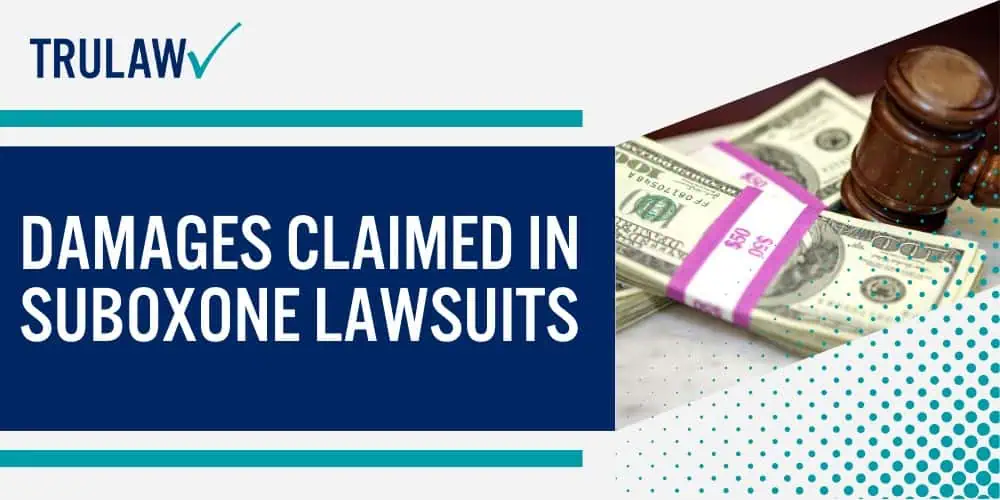
Plaintiffs generally seek compensation to address their damages according to the severity of their injuries backed by the documentation of verifiable medical evidence.
Economic damages focus on quantifiable expenses, while non-economic damages address the subjective impact on plaintiffs’ lives.
Economic Damages: Medical Costs and Treatments
These claims reflect the financial burden of oral health issues caused by the acidic nature of buprenorphine medications.
Economic damages in the Suboxone MDL typically focus on recouping the extensive dental and medical expenses that plaintiffs have incurred or may incur due to Suboxone-related oral health complications.
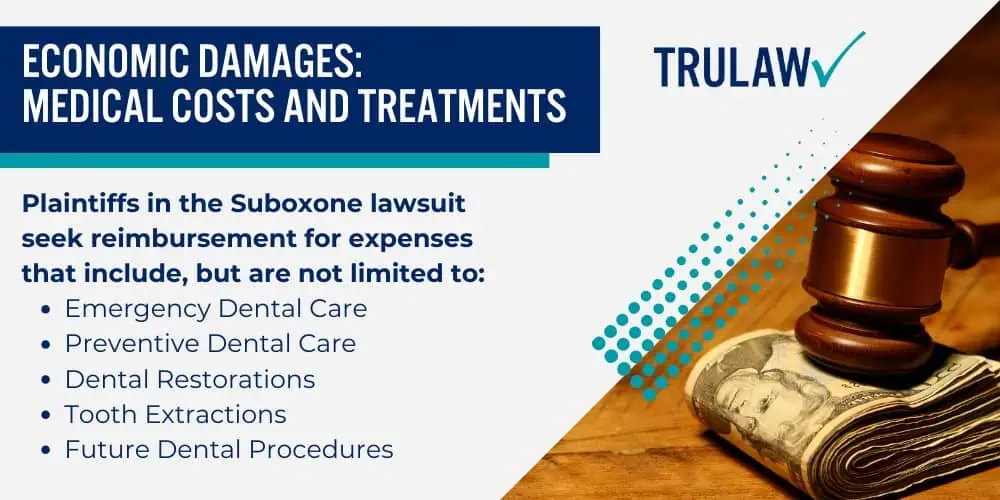
Plaintiffs in the Suboxone lawsuit seek reimbursement for expenses that include, but are not limited to:
- Emergency Dental Care: Immediate treatment for severe dental pain or sudden tooth damage caused by Suboxone use.
- Preventive Dental Care: Costs for preventive care, cleanings, and follow-up appointments to mitigate further decay.
- Dental Restorations: Fillings, crowns, and other procedures are required to address tooth decay and erosion.
- Tooth Extractions: Costs related to tooth removal and replacement options, such as dental implants or bridges, due to Suboxone-related decay.
- Future Dental Procedures: Projected costs for anticipated dental work to manage long-term impacts from Suboxone-related dental damage.
Economic damages are intended to help restore plaintiffs’ financial status to what they would have had without experiencing the adverse health effects of Suboxone.
Claimants should compile dental records, treatment receipts, and estimates for future care to substantiate the economic impact of the damage incurred.
An experienced Suboxone lawyer at TruLaw can help you access and organize medical evidence, such as dental treatment records, to strengthen your claim in pursuit of compensation.
Non-Economic Damages: Pain, Suffering, and Quality of Life Impact
Non-economic damages aim to address the broader, less tangible impacts of Suboxone-related dental damage, focusing on the physical and emotional toll these oral health issues have on plaintiffs.
These damages address how Suboxone use may have decreased the plaintiffs’ quality of life and well-being.
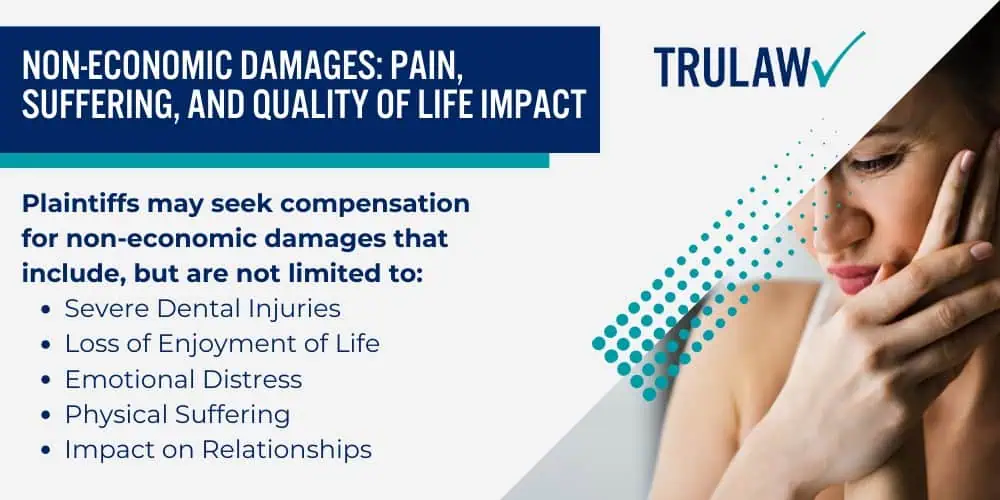
Plaintiffs may seek compensation for non-economic damages that include, but are not limited to:
- Severe Dental Injuries: Persistent or recurring pain due to tooth decay and erosion.
- Loss of Enjoyment of Life: Reduced ability to enjoy daily activities, social interactions, or meals due to dental discomfort.
- Emotional Distress: Anxiety, embarrassment, or depression resulting from visible dental damage and the long-term effects of tooth loss.
- Physical Suffering: Discomfort from invasive dental procedures and the ongoing effects of dental damage.
- Impact on Relationships: Strain on personal relationships due to the physical and emotional effects of Suboxone-related dental damage.
These non-economic damages highlight the significant life disruptions and emotional distress associated with Suboxone use.
Plaintiffs may support these claims with personal testimonies, statements from dental and mental health professionals, and records that demonstrate the impact of these issues on their quality of life.
The Suboxone MDL seeks to secure comprehensive compensation for plaintiffs facing Suboxone-induced dental complications by carefully considering the potential economic and non-economic damages inflicted due to Indivior Inc.’s negligence.
If you or a loved one has experienced oral health issues after using Suboxone, you may be eligible to seek compensation.
Contact TruLaw using the chat on this page to receive an instant case evaluation and learn if you qualify to join others filing a claim in the Suboxone MDL today.
Eligibility Criteria to File a Suboxone Claim
Filing a Suboxone claim requires specific eligibility criteria typically based on the claimant’s injuries, the circumstances of Suboxone use, and the presence of adverse health impacts.
Plaintiffs are responsible for generally demonstrating they were prescribed Suboxone, used it as directed, and subsequently suffered adverse effects or complications tied to the medication.
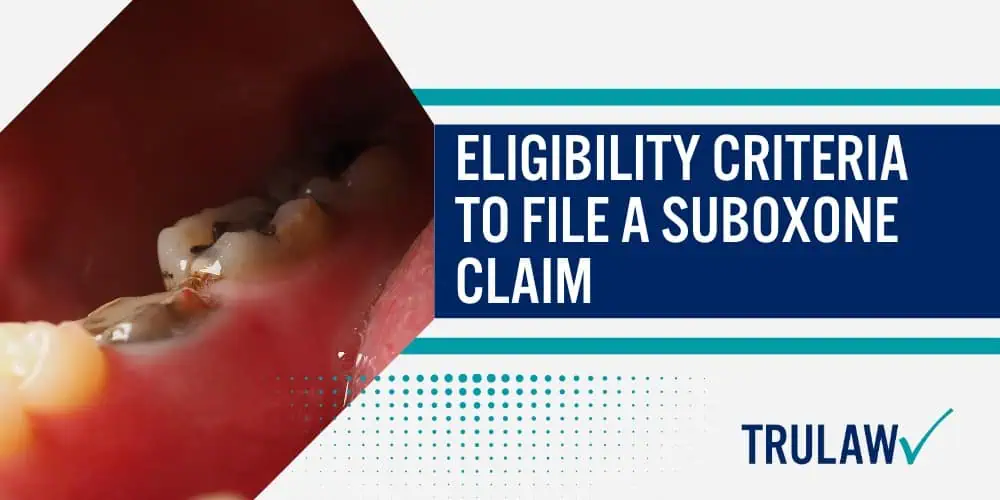
Eligibility often hinges on showing a lack of informed consent regarding the risks of dependency and other potential long-term consequences.
Types of Injuries Reported in the Suboxone MDL
There are several common injuries reported by plaintiffs in the Suboxone lawsuits that result in substantial physical and financial hardship due to ongoing dental issues.
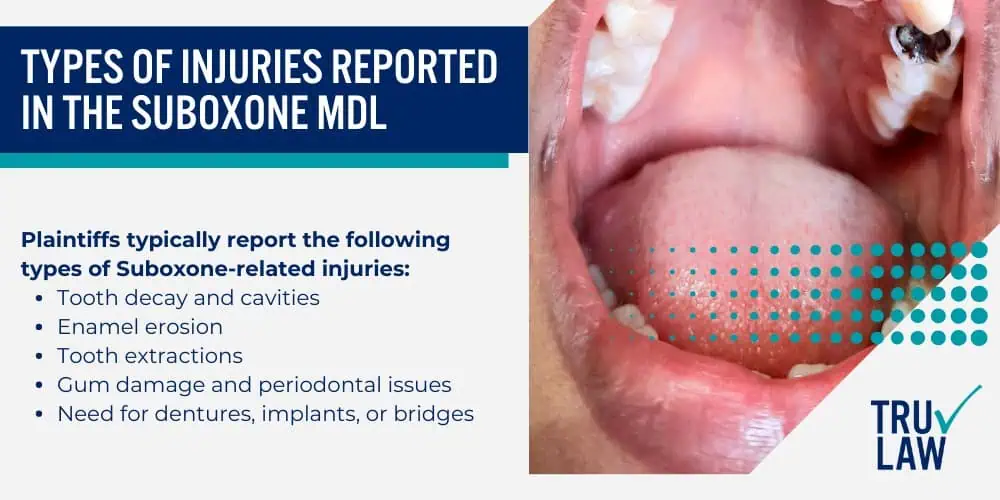
Plaintiffs typically report the following types of Suboxone-related injuries:
- Tooth decay and cavities: Severe decay often requires fillings or more extensive restorations.
- Enamel erosion: Damage to tooth enamel due to the acidic formulation of Suboxone, leading to sensitivity and pain.
- Tooth extractions: Instances where damage has resulted in irreparable tooth loss, necessitating extraction.
- Gum damage and periodontal issues: Oral health complications may include gum recession and increased risk of periodontal disease.
- Need for dentures, implants, or bridges: Extensive dental procedures are required to restore oral functionality and appearance due to Suboxone damage.
These early test cases can help set precedents regarding the types of evidence and documentation needed to demonstrate a causal link between Suboxone use and specific dental injuries.
The outcomes of these bellwether trials typically shape expectations around potential compensation for plaintiffs whose claims involve verified Suboxone-related dental harm.
Suboxone Lawsuit Statute of Limitations
Filing a Suboxone lawsuit within the appropriate statute of limitations is vital to preserve a claimant’s right to compensation.
The statute of limitations—the period within which a legal claim must be filed—varies by state but typically ranges from two to four years for personal injury cases.
In some instances, this time frame may begin only when the claimant becomes aware of the injury’s connection to Suboxone use, known as the “discovery rule.”
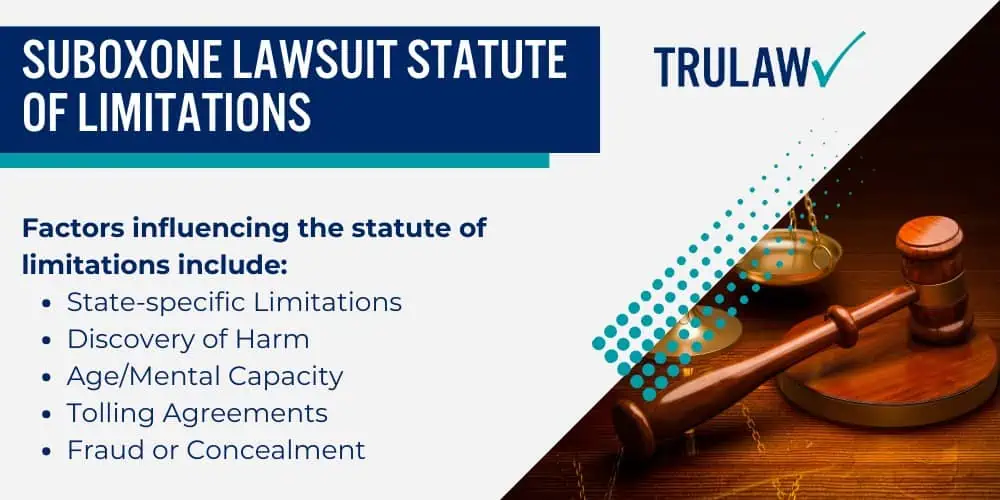
Factors influencing the statute of limitations include:
- State-specific Limitations: Each state has unique limitations periods for personal injury claims.
- Discovery of Harm: The timeframe may start when the plaintiff first connects their health issue to Suboxone.
- Age/Mental Capacity: In cases involving minors or individuals with cognitive impairments, statutes may be extended.
- Tolling Agreements: Some MDL agreements may toll or pause the statute of limitations under specific conditions.
- Fraud or Concealment: The timeframe to file in the Suboxone MDL may be extended if it’s proven that Indivior actively concealed the risk of oral health side effects to patients and doctors.
Failure to file within the applicable statute of limitations can result in a loss of eligibility to pursue a Suboxone claim.
Working closely with an experienced Suboxone tooth decay lawyer at TruLaw can help you understand the statutes of limitations relevant to your case so that you can take prompt legal action.
Contact us today using the chat on this page to receive an instant case evaluation that will determine your eligibility to join others in filing for the Suboxone MDL today.
Suboxone Tooth Decay Lawsuit Process
The MDL process enables these cases to undergo streamlined discovery and pre-trial proceedings, reducing redundancy and facilitating more efficient handling of the widespread claims.
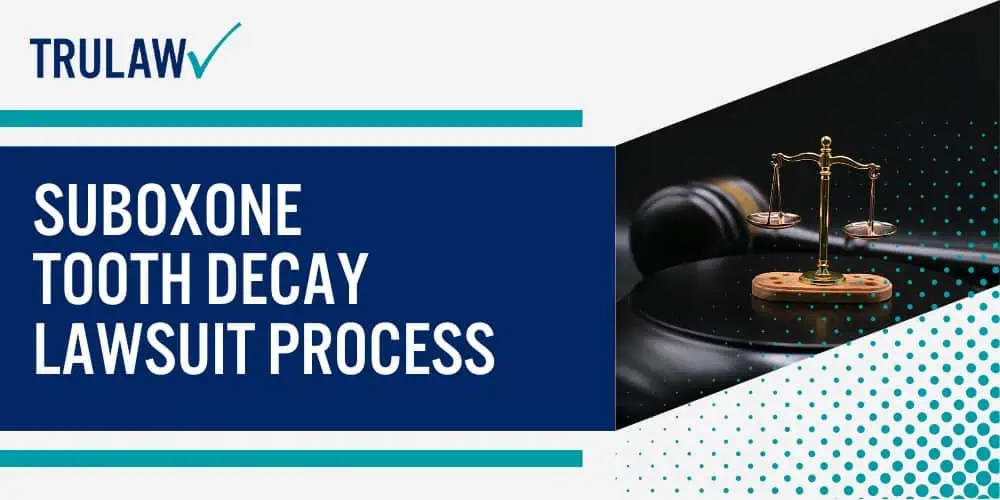
The legal process allows each plaintiff to present their unique case for potential compensation managed collectively within the MDL framework.
Steps to File for the Suboxone MDL 3092
Filing a claim under MDL 3092 involves a structured set of steps to centralize and support individual cases.
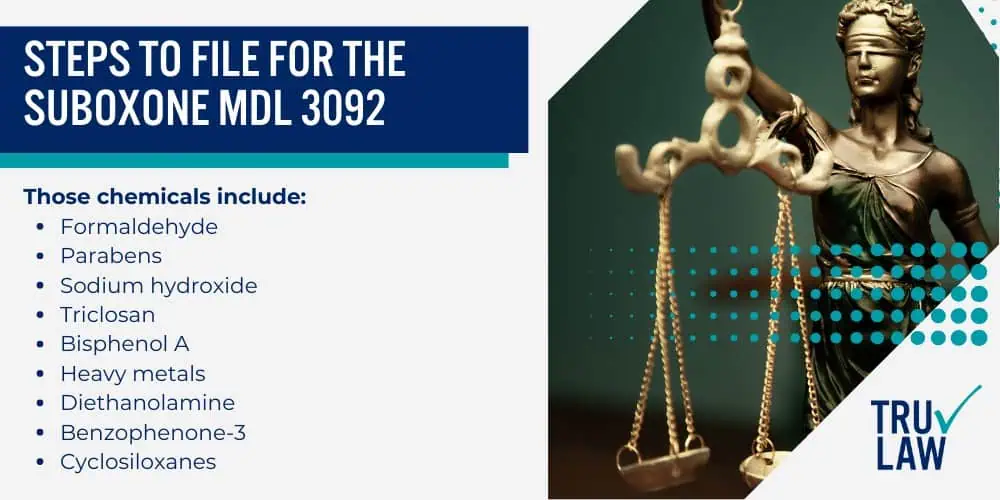
Plaintiffs generally follow these stages to participate in the consolidated litigation:
- Initial Case Review: Individuals consult attorneys to assess the damage of their injuries believed to have been caused by dental complications from Suboxone film.
- Claim Filing: Attorneys file claims in the federal court overseeing the MDL to ensure each case is included under Judge Calabrese’s jurisdiction.
- Discovery Phase: All parties gather and share evidence in this stage, including expert testimonies and relevant medical records. This evidence builds the collective case against Indivior while preserving individual claim specifics.
- Pre-Trial Motions: Both sides may file motions, including Indivior’s attempts to dismiss specific claims. Recent rulings have favored plaintiffs by allowing complete discovery to proceed.
- Settlement Negotiations: Given the scope of these claims, settlement discussions may begin during or after discovery, aiming to reach an agreement without going to trial.
This coordinated approach allows plaintiffs to benefit from consolidated resources and strengthens their claims through shared data and expert insights.
Suboxone Plaintiff Leadership Committee
The Suboxone Plaintiff Leadership Committee (PLC) coordinates the litigation strategy, manages discovery efforts, and represents plaintiffs’ collective interests in court proceedings and settlement negotiations.
The leadership committee also works closely with the court to focus efforts on advancing the litigation forward while preserving individual plaintiffs’ rights to seek appropriate compensation for their injuries.
Upcoming Bellwether Trials: Suboxone MDL 3092:
The bellwether trials for the Suboxone MDL are anticipated to be scheduled at the next status conference, which will finalize the selection process for cases that best represent the claims of dental injuries linked to Suboxone film use.
These trials will establish foundational decisions to guide the resolution of thousands of similar cases within MDL 3092 by evaluating the persuasiveness of plaintiffs’ evidence while exploring jury responses to potential compensatory and punitive damages.
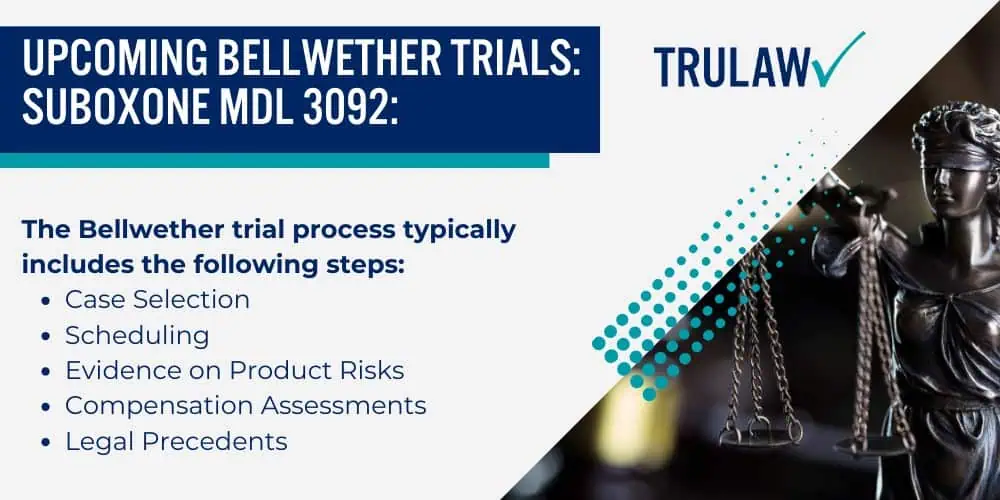
The Bellwether trial process typically includes the following steps:
- Case Selection: Trials will consist of representative cases typical of the broader MDL claims, focusing on significant dental injuries.
- Scheduling: The trials are expected to occur as early as 2025, and multiple cases will be selected to determine consistent jury patterns.
- Evidence on Product Risks: Plaintiffs aim to demonstrate that Indivior neglected to disclose the dental risks of Suboxone film until the FDA-mandated warning in 2022.
- Compensation Assessments: Bellwether cases will address potential compensation for medical costs, non-economic damages, and possibly punitive damages.
- Legal Precedents: These initial cases may create a framework for resolving other cases in the MDL.
The leadership committee has effectively countered Indivior’s previous dismissal attempts by highlighting the manufacturer’s ability to update warnings through the FDA’s Changes Being Effected (CBE) regulations.
The upcoming bellwether trials are expected to significantly influence settlement discussions that may accelerate the negotiations within the broader litigation.
TruLaw: Your Suboxone Tooth Decay Law Firm
Suboxone tooth decay lawsuits are being filed by individuals across the country who were diagnosed with severe dental problems after taking Suboxone or generic buprenorphine to treat opioid addiction.
TruLaw is currently accepting clients for the Suboxone tooth decay multidistrict litigation (MDL).
A few reasons to choose TruLaw for your Suboxone tooth decay lawsuit include:
- If We Don’t Win, You Don’t Pay: The Suboxone lawyers at TruLaw and our partner firms operate on a contingency fee basis, meaning we only get paid if you win.
- Expertise: We have years of experience handling dangerous drug cases similar to the Suboxone tooth decay litigation, which helps us anticipate what we can expect to see in your case and the regulations we will be required to meet.
- Successful Track Record: TruLaw and our partner law firms have helped our clients recover billions of dollars in compensation through verdicts and negotiated settlements.
If you or a loved one suffered severe tooth decay or dental problems after taking Suboxone or generic buprenorphine, you may be eligible to seek compensation.
Contact TruLaw using the chat on this page to receive an instant case evaluation that will determine your eligibility to join others in filing for the Suboxone tooth decay MDL today.
Suboxone Lawsuit Frequently Asked Questions
-
No, there is not a class action lawsuit against the manufacturer of Suboxone for dental issues.
Instead, Suboxone tooth decay lawsuits are part of multidistrict litigation (MDL), consolidating individual claims from patients suffering severe dental side effects.
This MDL allows plaintiffs with similar complaints, such as tooth decay, tooth loss, and gum disease, to streamline their cases against the manufacturer while maintaining separate claims for individual damages.
-
Suboxone is manufactured by Indivior, a pharmaceutical company specializing in treatments for opioid dependence and related conditions.
Originally, Indivior was part of Reckitt Benckiser, but it became an independent company in 2014.
Indivior produces Suboxone in various forms, including film and tablets, and faces allegations in lawsuits related to the side effects of this widely used medication.
-
The Suboxone lawsuit centers on claims that the drug’s manufacturer failed to warn users about severe dental side effects, such as tooth decay, tooth loss, and gum disease.
Plaintiffs argue these issues developed even when patients followed standard dental care practices.
The lawsuit seeks compensation for medical expenses, pain and suffering, and other damages caused by these alleged failures to disclose the risks associated with long-term Suboxone use.
-
Yes, you may still be able to join the Suboxone lawsuit if you’ve experienced severe dental problems potentially linked to Suboxone use.
Eligibility generally depends on factors like when you started using Suboxone, the duration of use, and documented dental health issues.
Those affected should seek legal guidance to determine eligibility and ensure they meet filing deadlines, as timelines vary based on jurisdiction.
-
While no average payout has been determined yet, potential settlements could range significantly depending on individual factors, such as the severity of dental damage and related expenses.
Early estimates from similar cases suggest that settlements could be substantial if the lawsuit succeeds.
Claimants with extensive dental issues and high treatment costs may receive higher compensation, though specific amounts will vary based on case details.
-
If you work with a firm on a contingency basis, filing a Suboxone dental claim typically incurs no upfront cost.
This arrangement allows plaintiffs to pursue compensation without out-of-pocket fees, as the attorney is paid a percentage of the settlement or award only if the claim is successful.
This fee structure makes it accessible for those seeking justice for Suboxone-related dental issues.

Managing Attorney & Owner
With over 25 years of legal experience, Jessica Paluch-Hoerman is an Illinois lawyer, a CPA, and a mother of three. She spent the first decade of her career working as an international tax attorney at Deloitte.
In 2009, Jessie co-founded her own law firm with her husband – which has scaled to over 30 employees since its conception.
In 2016, Jessie founded TruLaw, which allows her to collaborate with attorneys and legal experts across the United States on a daily basis. This hypervaluable network of experts is what enables her to share the most reliable, accurate, and up-to-date legal information with our readers!
Additional Suboxone Lawsuit resources on our website:
Here, at TruLaw, we’re committed to helping victims get the justice they deserve.
Alongside our partner law firms, we have successfully collected over $3 Billion in verdicts and settlements on behalf of injured individuals.
Would you like our help?
At TruLaw, we fiercely combat corporations that endanger individuals’ well-being. If you’ve suffered injuries and believe these well-funded entities should be held accountable, we’re here for you.
With TruLaw, you gain access to successful and seasoned lawyers who maximize your chances of success. Our lawyers invest in you—they do not receive a dime until your lawsuit reaches a successful resolution!
AFFF Lawsuit claims are being filed against manufacturers of aqueous film-forming foam (AFFF), commonly used in firefighting.
Claims allege that companies such as 3M, DuPont, and Tyco Fire Products failed to adequately warn users about the potential dangers of AFFF exposure — including increased risks of various cancers and diseases.
Depo Provera Lawsuit claims are being filed by individuals who allege they developed meningioma (a type of brain tumor) after receiving Depo-Provera birth control injections.
A 2024 study found that women using Depo-Provera for at least 1 year are five times more likely to develop meningioma brain tumors compared to those not using the drug.
Suboxone Tooth Decay Lawsuit claims are being filed against Indivior, the manufacturer of Suboxone, a medication used to treat opioid addiction.
Claims allege that Indivior failed to adequately warn users about the potential dangers of severe tooth decay and dental injuries associated with Suboxone’s sublingual film version.
Social Media Harm Lawsuits are being filed against social media companies for allegedly causing mental health issues in children and teens.
Claims allege that companies like Meta, Google, ByteDance, and Snap designed addictive platforms that led to anxiety, depression, and other mental health issues without adequately warning users or parents.
Transvaginal Mesh Lawsuits are being filed against manufacturers of transvaginal mesh products used to treat pelvic organ prolapse (POP) and stress urinary incontinence (SUI).
Claims allege that companies like Ethicon, C.R. Bard, and Boston Scientific failed to adequately warn about potential dangers — including erosion, pain, and infection.
Bair Hugger Warming Blanket Lawsuits involve claims against 3M — alleging their surgical warming blankets caused severe infections and complications (particularly in hip and knee replacement surgeries).
Plaintiffs claim 3M failed to warn about potential risks — despite knowing about increased risk of deep joint infections since 2011.
Baby Formula NEC Lawsuit claims are being filed against manufacturers of cow’s milk-based baby formula products.
Claims allege that companies like Abbott Laboratories (Similac) and Mead Johnson & Company (Enfamil) failed to warn about the increased risk of necrotizing enterocolitis (NEC) in premature infants.
Here, at TruLaw, we’re committed to helping victims get the justice they deserve.
Alongside our partner law firms, we have successfully collected over $3 Billion in verdicts and settlements on behalf of injured individuals.
Would you like our help?
